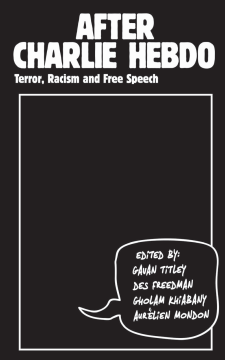
Additional Information
Book Details
Abstract
As the world looked on in horror at the Paris terror attacks of January and November 2015, France found itself at the centre of a war that has split across nations and continents. The attacks set in motion a steady creep towards ever more repressive state surveillance, and have fuelled the resurgence of the far right across Europe and beyond, while leaving the left dangerously divided. These developments raise profound questions about a number of issues central to contemporary debates, including the nature of national identity, the limits to freedom of speech, and the role of both traditional and social media.
After Charlie Hebdo brings together an international range of scholars to assess the social and political impact of the Paris attacks in Europe and beyond. Cutting through the hysteria that has characterised so much of the initial commentary, it seeks to place these events in their wider global context, untangling the complex symbolic web woven around 'Charlie Hebdo' to pose the fundamental question - how best to combat racism in our supposedly ‘post-racial’ age?
Gavan Titley is a senior lecturer in Media Studies in Maynooth University, and a Docent in the Swedish School of Social Science, Helsinki University. He is the author of The Crises of Multiculturalism: Racism in a Neoliberal Age (with Alana Lentin, 2011) and Racism and Media (forthcoming, 2018) and his most recent edited book is National Conversations? Public Service Media and Cultural Diversity (2013). He is a co-editor of the book series Challenging Migration Studies.
Des Freedman is professor of Media and Communications at Goldsmiths, University of London. He is the author of The Contradictions of Media Power (2014) and The Politics of Media Policy (2008). He is also an editor of the journal Global Media and Communication.
Aurelien Mondon is a senior lecturer in French and Comparative politics at the University of Bath. His research focuses for the most part on the concepts of populism and racism and their impact on democracy. His first monograph A Populist Hegemony? The mainstreaming of the extreme right in France and Australia was published in 2013.
Gholam Khiabany is a senior lecturer in the Dept of Media and Communications at Goldsmiths, University of London.
‘A unique transnational take on the weaponisation of liberal values after the Paris attacks. After Charlie Hebdo takes Islamophobia apart and equips us for the fight back.’
Liz Fekete, Director, Institute of Race Relations
‘An engaging contribution to our understanding of the 2015 attacks, examining the media framing of the event and the conflict of values it created in public debate.’
Romain Badouard, University of Cergy-Pontoise
‘A bold, challenging and forthright collection that raises fundamental questions around issues of race and identity.’
Michael Cronin, Trinity College Dublin
‘These essays offer stimulating perspectives on the violent paradoxes of French liberalism. For English speakers, they give valuable context to the political dynamics behind the Charlie episode.’
Nick Riemer, University of Sydney
‘The attack on Charlie Hebdo has been a transformative event, one that presents particular challenges for freedom of speech. This insightful collection helps us to reflect on how we can develop an alternative narrative on violence, racism and freedom of expression.’
Donatella della Porta, Scuola Normale Superiore (Florence)
Table of Contents
| Section Title | Page | Action | Price |
|---|---|---|---|
| Cover | cover | ||
| Endorsements | i | ||
| Title page | iii | ||
| Copyright | iv | ||
| Contents | v | ||
| Acknowledgements | vii | ||
| Introduction | 1 | ||
| Part I. The contested republic | 29 | ||
| 1. Charlie Hebdo, Republican secularism and Islamophobia | 31 | ||
| 2. The meaning of ‘Charlie’: the debate on the troubled French identity | 46 | ||
| 3. After the drama: the institutionalisation of gossiping about Muslims | 63 | ||
| 4. A double-bind situation? The depoliticisation of violence and the politics of compensation | 79 | ||
| Part II. The long ‘war on terror’ | 95 | ||
| 5. The whiteness of innocence: Charlie Hebdo and the metaphysics of anti-terrorism in Europe | 97 | ||
| 6. The visible hand of the state | 114 | ||
| 7. Symbolic politics with brutally real effects: when ‘nobodies’ make history | 129 | ||
| 8. Extremism, theirs and ours: Britain’s ‘generational struggle’ | 146 | ||
| Part III. Media events and media dynamics | 163 | ||
| 9. From Jyllands-Posten to Charlie Hebdo: domesticating the Mohammed cartoons | 165 | ||
| 10. | 180 | ||
| 11. Mediated narratives as competing histories of the present | 192 | ||
| Part IV. The politics of free speech | 207 | ||
| 12. Media power and the framing of the Charlie Hebdo attacks | 209 | ||
| 13. We hate to quote Stanley Fish, but: “There’s no such thing as free speech, and it’s a good thing, too.” Or is it? | 223 | ||
| 14. Jouissance and submission: ‘free speech’, colonial diagnostics and psychoanalytic responses to Charlie Hebdo | 239 | ||
| Part V. Racism and anti-racism in post-racial times | 257 | ||
| 15. Not afraid | 259 | ||
| 16. ‘Je Suis Juif’: Charlie Hebdo and the remaking of antisemitism | 262 | ||
| 17. Race, caste and gender in France | 278 | ||
| 18. The ideology of the Holy Republic as part of the colonial counter-revolution | 291 | ||
| About the contributors | 304 | ||
| Index | 308 |
